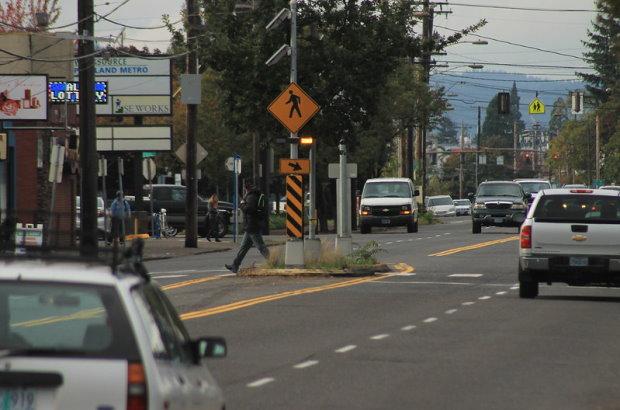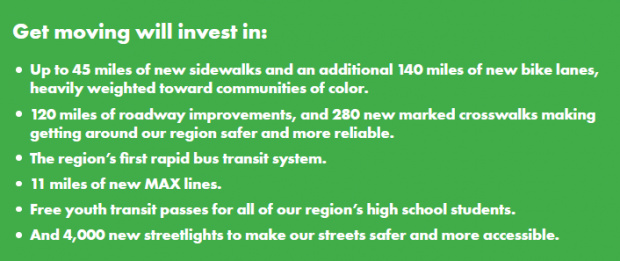Whether you are buying groceries, getting to work, or making a doctor's appointments on time, the transportation system is a crucial part of everyone’s life. Transportation systems can enable or restrict us from accessing essential services, job opportunities, or even break the cycle of poverty. A study by Harvard University found that commute time (as determined by access to efficient and reliable transportation) is the biggest factor for being able to escape poverty. Unfortunately, the Portland Metro region’s traffic congestion (and resulting traffic deaths) have already risen to nearly pre-pandemic levels, and we know that will only get worse as our region continues to grow exponentially over the next decade. We need to make it easier for people and goods to move through the Portland Metro region.
Compounding these struggles is the fact that our transportation sector is our region’s biggest source of climate pollution. On top of all that, Multnomah County residents are burdened by some of the worst diesel pollution levels in the entire country. Every year, the vehicles and systems relying on fossil fuels like gasoline and diesel emit more toxic climate and air pollution every year. It is an all-hands-on-deck crisis that requires many solutions at all levels of government (from local and regional, up to state and federal) to reduce car dependence and increase transportation options, electrify all we can including cars, trucks, and buses, and use cleaner fuels for the rest.
It’s clear that the time to solve these major problems is now (we’re actually decades overdue for many of these investments, but now is better than never). But equally important is how we solve these issues facing our region. Reducing transportation inequities (as well as congestion and climate pollution) by investing in better public transit that allows people to get to essential services and opportunities is critical.
Measure 26-218 (a.k.a Let’s Get Moving 2020) is an important first step that starts to address the longstanding cycle of systemic racism and the historic lack of investment in underserved communities across our region, while also positioning us to begin the necessary work of investing in Portland’s regional climate-smart future. If approved by voters, Measure 26-218 will make the biggest investment in our Portland Metro region’s transit system in a generation. It will help create our region’s first rapid bus network - getting buses in the tri-county area out of traffic and moving faster and more reliably. It will make it more affordable, reliable, faster and better to ride the bus and catch the MAX. The measure will also enable TriMet — currently the state’s biggest user of diesel — to transition to an all-electric bus fleet. That means less diesel pollution and greenhouse gases in our air for every bus line in our region.
Transit that is plentiful, reliable, accessible, safe and affordable, as well as non-polluting, is foundational to a growing, modernizing transportation system that aligns with our region’s commitment to equity and achieving our climate goals. On top of all these positive, needed improvements, Let’s Get Moving 2020 will create tens of thousands of jobs, an absolute necessity to spark economic activity to rebuild from the COVID-induced slow-down we face.
Through an intensive, 18 month-long community engagement process, Metro listened to community members who loudly demanded the prioritization of climate and equity. This community-responsive approach to forming the package is why this measure includes investments in expansive safety improvements, regional youth-pass, safe routes to school and walkable, transit-friendly corridors throughout the region. These are exactly the type of investments we must be making for the health and safety of our most vulnerable communities — and that long-ignored community members have been demanding for years.
The transportation investment choices of the past have failed our region. We believe that reducing climate pollution is a vital part of a long-overdue reimagining our transportation system, one which supports thriving communities in every part of the Portland Metro region. We cannot silo climate solutions for transportation that ignore the myriad ways that our transportation system can negatively impact or positively benefit peoples’ lives. This is especially true for those communities disproportionately burdened by the current transportation system and air pollution status quo, including Black, Indigenous, and communities of color and low-income communities. Why else are we fighting to stop the disastrous effects of climate change if it’s not to create a thriving and just world for all in the process?
While this isn’t the last and only measure and set of investments we need to tackle the climate crisis, we are glad it includes critical investments that move the needle toward an equitable regional transportation system that aligns with our climate and clean economy goals. We need a regional approach and regional solutions to keep up with our growing region’s transportation needs in the face of the climate crisis, while addressing systemic racism and other historical injustices that continue to affect our communities. And that’s what Metro’s Get Moving 2020 (Yes on Measure 26-218) represents.
Climate Solutions and Oregon Environmental Council proudly endorse Let’s Get Moving 2020. Please don’t miss your chance to vote YES on Measure 26-218 at the bottom of your ballot.

